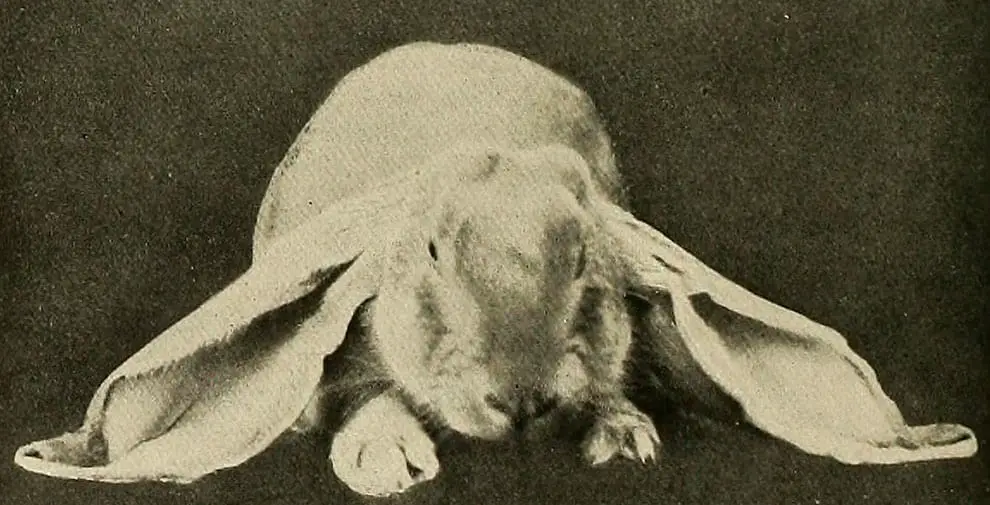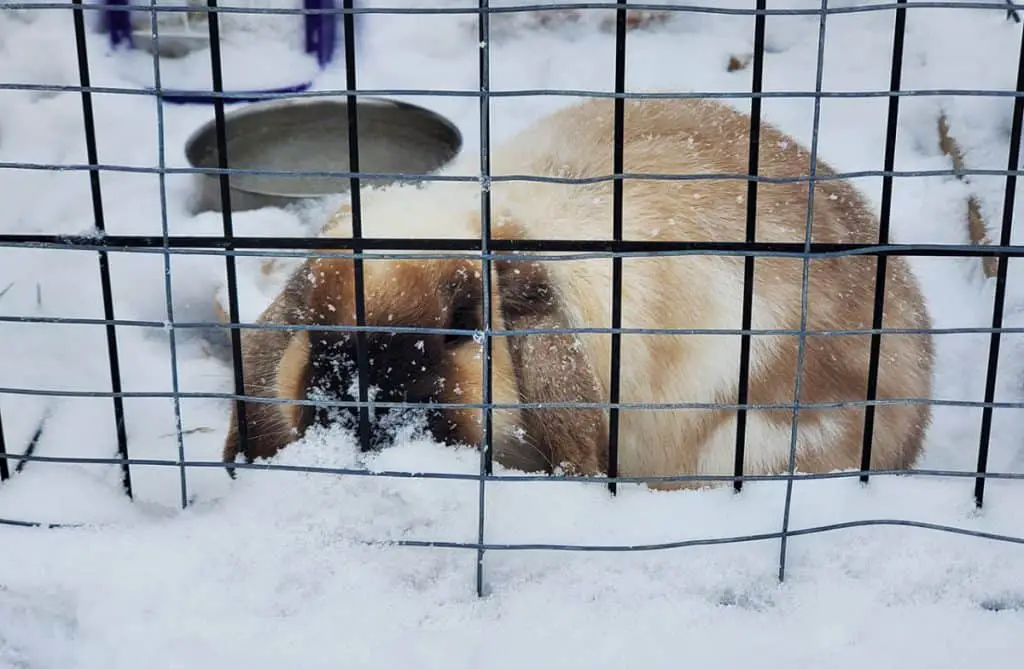Disclosure: We may earn money or products from the companies mentioned in this post.
Sometimes our pet rabbit’s ears feel hot to the touch and other times they feel cold to the touch? But why?
Rabbits largely regulate their body temperature through their ears. They have large blood vessels in their ears which can expand or contract in a matter of moments to either release warmth or maintain warmth. This explains why sometimes your rabbit’s ears feel hot or cold.
The temperature of a rabbit’s ears is not a reliable way to diagnose the health of your rabbit.
Normal Rabbit Body Tempeture
The normal body temperature for rabbits according to Michigan State University is between 101 – 103°F. The only way to accurately measure a rabbit’s temperature is with a rectal themometer and the assistance of your veterinarian. You cannot determine the temperature of your bunny based solely on touch.
Rabbits do not have sweat glands and they do not pant so they use their ears to regulate their body temperature. This means when a rabbit is running at a temperature its ears will feel warmer to the touch than normal.
However, touching a rabbit’s ears isn’t a truly accurate way of telling whether a rabbit is ill and should only be one of the indicators of rabbit wellness that you’re watching for.
To decide if your rabbit is sick and needs veterinarian treatment you can monitor the temperature of your rabbit’s ears, but you should also learn to read your rabbit’s body language and monitor their eating habits and bowel movements.
For example, your rabbit’s ears might feel extremely cold and if that is combined with your bunny being lethargic and not eating, then you need to call your vet. Likewise, if your rabbit’s ears feel unusually warm and you notice that they haven’t been actively playing or going to the bathroom then it’s also time to call your vet.

Rabbit Cold Ears
Cold rabbit ears are usually not a cause of concern. It is usually normal for rabbits to have cold ears when the temperature of their surroundings is lower than their body temperature. This is because the rabbit can restrict the blood vessels in its ears to preserve body heat.
A rabbit’s ears are made up of complex and interconnected blood vessels that help them regulate their body temperature. When bunnies feel the need to warm up the blood vessels in their ears will close up to prevent more heat from escaping. Thus, their ears will feel colder to the touch.
Rabbits also tend to curl up when they feel cool. They will also pin their ears back against their bodies. This reduces thermal exchanges between their bodies and the environment thus conserving body heat.
Rabbit ears also have very little fur so their ears have little insulation because it allows heat to escape more easily as compared to the other fluff-covered parts of their body. It is also the reason why rabbits tolerate cold more than heat.
Please remember that cold ears aren’t necessarily a sign that your rabbit is too cold. Rabbits can live outdoors in all but the coldest environments and many bunnies even love playing in the snow when given the opportunity.

When A Rabbit’s Cold Ears Are Cause For Concern
A rabbit having cold ears is not a cause of concern without other symptoms. For example, if your rabbits ears are cold and exhibiting behaviors such as lethargy or loss of appetite then there is cause for concern.
In most cases, you should just compare your rabbit’s ear temperature to its environmental temperture. If your bunny’s area is older than usual then your rabbit is probably just conserving body heat.
Cold Rabbit Ears After Spaying
While a rabbit is recovering from spaying, it is not uncommon for them to have cold ears. It is also not uncommon for these cold ears to cause alarm for the bunny’s owners. However, in most cases, cold ears after surgery are fine and no cause for concern.
A rabbit’s cold ears after being spayed (or any other invasive surgery) is usually caused by the body’s reaction to anesthesia. When anesthesia is applied to a rabbit or any other small animal, it often causes the body temperature of the animal to drop. This is a normal reaction.
This is also mainly the reason why vets have heating elements in their facilities for post-op care.
If you find that your rabbit’s ears are extremely cold after surgery, then I recommend that you check their internal body temperature by using a veterinarian-grade rectal thermometer like this one on Amazon. If your rabbit’s temperature falls below the normal range of 101 to 103 degrees Fahrenheit, then your rabbit might be suffering from hypothermia and you need to contact your vet immediately.
Rabbits Hot Ears
A rabbit having hot ears is not a cause of concern for rabbits. It usually just means that your rabbit is in a hot area and she is trying to release heat through her ears.
Rabbits use their ears as thermoregulators. The bigger their ears, the more heat they can release. This is the reason why wild rabbits that live in hot climates tend to have larger ears.
According to research done by the University of Michigan titled Rabbit Summer Care, when temperatures rise above what is comfortable for rabbits, the rabbits will consume less food and instead use more energy so they can release heat from their bodies. As their body temperature rises, the vessels in the rabbit’s ears will open up allowing the bunnies to release more heat.
This is often the reason why your rabbit’s ears are hotter than usual.
When A Rabbit’s Hot Ears Cause For Concern
A rabbit having hot ears alone is not cause for concern. However, if hot ears are accompanied by other behaviors that might indicate illness such as lethargy, loss of appetite, and heavy panting then you should be concerned and contact your vet.
Temperatures above 92°F can cause heat stroke or heat prostration in rabbits, though domestic rabbits commonly live in and survive in much hotter temperatures as long as they have adequate water, shade, and air movement.
Overweight rabbits are especially prone to suffering from heatstroke so you should avoid obesity by feeding a proper rabbit diet.
Symptoms of heatstroke for rabbits are the following:
- Change of color (blue lips, tongues, and ears)
- Fast heart rate and rapid breathing
- Wet noses and mouth due to excessive drooling
- Blood-tinged discharge from their mouth
- Heavy panting
If your rabbit is experiencing heat stroke then you must try to lower its body temperature immediately. Heatstroke is commonly fatal to rabbits. I recommend moving them to a cooler area, putting a fan on them, and wrapping them in a cold towel for moments at a time until they begin to recover.
Note that you can avoid heat strokes by providing well-ventilated rabbit hutches. It should be that the humidity of rabbitry is kept at 60 percent and the temperature should be kept between 40°F to 80°F. Some owners buy fans that they attach to hutches or cages to help keep their rabbits cool.
Some owners who also keep their rabbits outdoors use sprinklers to wet the roofs of the rabbit hutches. This can help cool the rabbit’s surroundings but you also have to make sure that the humidity isn’t too high otherwise you might be doing more harm than good.
Also, the most important tip is to keep your rabbits hydrated. Try putting ice cubes in their water. Know that rabbits will drink 4x more water than usual when it’s hot, so keep their bowls filled to the brim.
Rabbits have a very distinct physiology, their lean legs are made for hopping and running while their ears are made to be their defining feature as well as their best thermoregulators.
There are so many things fascinating when it comes to rabbits!
Do you have experience dealing with cold or hot rabbit ears? What did you do?
Share your stories in our comment section below
